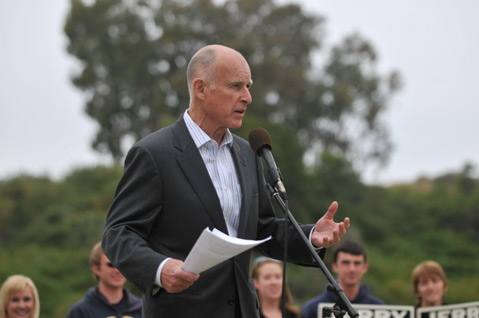Bill Factory
Crabby Governor Wonders Why Legislature Passes So Much Legislation

Jerry Brown’s cranky attitude about the 889 new bills that lawmakers sent him this year may be summed up in seven key words:
“Not every human problem deserves a law.”
That comment punctuated one of the governor’s more sharply worded veto messages, as he finished plowing through a pile of would-be laws this week, which dealt with everything from shark fins and stuffed mountain lions to tanning beds and a tax on olive trees.

Brown’s words were aimed specifically at a bill to make it illegal for kids to ski or snowboard without a helmet (“While I appreciate the value of wearing a ski helmet, I am concerned about the continuing and seemingly inexorable transfer of authority from parents to the state”), but they also reflected his broader view about the limits of state government.
“There’s definitely an uptick in legislative involvement in the affairs of Californians,” he told me in an interview, when asked to identify the biggest difference between his first terms as governor, three decades ago, and now.
“Every bill I look at, whether it’s a microchip on a dog or whether or not to develop a form for some new law, takes several hours or more for me to understand,” he added. “One bill alone is hard to understand … so you multiply that by several thousand, you have a system that is not very transparent.”
On one level, Brown’s kvetching about the volume of bills merely reflects the iconoclastic characteristic of his long career. At 73, however, Brown has decades of experience at every level of politics, from presidential candidate to mayor of Oakland — experience that has sharpened and deepened his skepticism about the effectiveness and unintended consequence of social engineering through legislation.
Numbers tell the story: As he met Sunday’s deadline for action on bills sent to him this year, Brown had signed 760 and vetoed 128 (one became law without his signature), a roughly 15-percent veto rate; while less than that of recent Republican governors, it’s twice as high as that of the two terms he served last century as a callow and youthful chief executive.
And the thrust of many vetoes, as Sacramento political writer Steven Harmon wrote, “slapped down dozens of bills that would have expanded the scope of government, and others that would have placed burdens on businesses …”
In the interview, Brown said that a culture of governance, based on lawmakers seeking to cure every conceivable problem of society by writing a bill, contributes to the overwhelming disapproval with which voters view politicians.
“That obviously reflects the complexity of society itself, but it does tax the system because there are so many prescriptions floating around, and this relatively small number of people [in the Capitol] can only grasp a part of what’s being done. So that makes government less transparent, less understandable.
“It’s not healthy for democracy that so much is opaque,” he added, “and I think regaining public confidence when it’s so low is very difficult, when what is being done is beyond the ken of most of the people in the process, let alone the people themselves.”
DREAMS AND DUES: While criticizing the number and complexity of proposed new laws, Brown’s most noteworthy political actions came on two very controversial measures, both sponsored by Democrats and strongly opposed by Republicans, which he chose to sign.
The first is the so-called DREAM (Development, Relief and Education for Alien Minors) Act, which will provide lower in-state tuition rates at UCs and state universities for students who are the children of illegal immigrants and who are working to become citizens.
The second requires that ballot initiatives be presented to voters in general, not primary, elections. Since Brown was elected as secretary of state in 1970, initiatives have often appeared on primary election ballots, but an end-of-session bill rammed through by Democrats will require all initiatives to be decided in November, when more Democrats typically turn out to vote, starting in 2012.
As a practical matter, the new law will hamper Republican efforts next year to pass a measure to restrict automatic withholding of dues from paychecks of workers in union shops, which likely would have fared better in the primary, when proportionately more GOP voters go to the polls.



